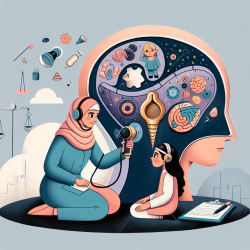Pediatric Auditory Processing Disorder (APD), also known as Central Auditory Processing Disorder (CAPD), is a complex condition that affects how the brain processes auditory information. Despite significant research advances, misconceptions about APD persist, leading to inadequate management and support for affected children. This blog aims to clarify these misconceptions and provide practitioners with insights to enhance their skills and improve outcomes for children with APD.
Misconception 1: APD Cannot Be Diagnosed
One prevalent misconception is that APD cannot be diagnosed due to the lack of a gold standard diagnostic test. However, the American Academy of Audiology provides guidelines that rely on a battery of tests to diagnose APD. Practitioners should expand their diagnostic techniques by incorporating new methods while comparing them with established standards. Understanding that a comprehensive test battery is essential for accurate diagnosis can help practitioners provide better care.
Misconception 2: Valid Conclusions Can Be Made Without Testing Central Auditory Processing
Another misconception is that conclusions about APD can be drawn without testing central auditory processing. This belief stems from the argument that current testing batteries do not adequately control cognitive and language variables. Practitioners should ensure they use efficient central auditory test batteries to accurately diagnose APD and differentiate it from other conditions like attention deficits or cognitive disorders.
Misconception 3: Discarding APD When It's a Secondary Diagnosis
Some believe that if APD is a secondary diagnosis, it should be discarded. This view overlooks the complexity of neurodevelopmental disorders and their co-morbidity with APD. Practitioners must recognize the importance of managing auditory processing problems alongside other conditions. Collaborating with multidisciplinary teams, including speech-language pathologists and psychologists, can lead to more effective management strategies.
Misconception 4: APD Reflects Cognitive Deficits
The notion that APD reflects cognitive deficits is akin to the nature versus nurture debate. While auditory perception contributes to cognitive assessment, it is crucial to distinguish between auditory processing deficits and cognitive impairments. Practitioners should ensure hearing acuity is corrected during assessments to avoid misdiagnosing cognitive impairments due to uncorrected auditory dysfunction.
Misconception 5: APD Is Not a Distinct Clinical Entity
The assertion that APD is not a distinct clinical entity relies on previously refuted misconceptions. Research over the past two decades has led to the classification of APD in international diagnostic systems as an "ear disease," confirming its status as a physiological entity requiring medical attention. Audiological societies worldwide recognize APD as a clinical entity, emphasizing the importance of proper diagnosis and management.
The Path Forward: Encouraging Further Research
The challenges in diagnosing and managing APD highlight the need for continued research and education among practitioners. By staying informed about new evaluation techniques and incorporating them into practice, audiologists can ensure they provide accurate diagnoses and effective treatments. Standardizing novel techniques across diverse populations will further validate these approaches for clinical adoption.
To read the original research paper, please follow this link: Common Misconceptions Regarding Pediatric Auditory Processing Disorder.










